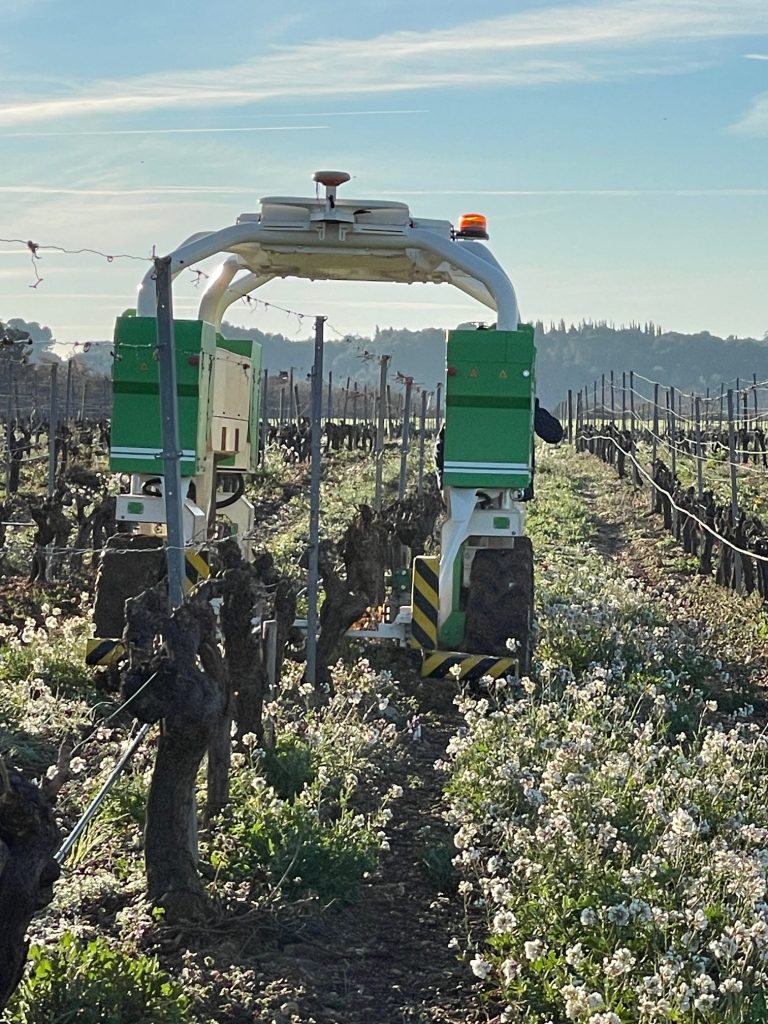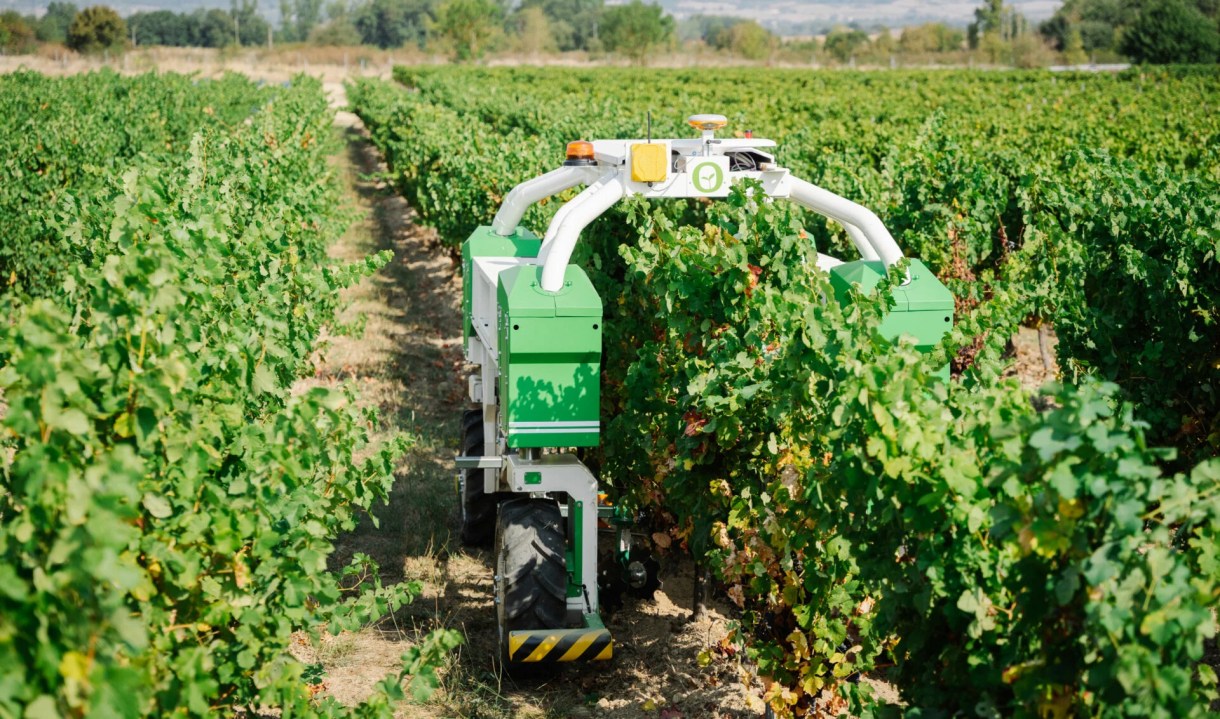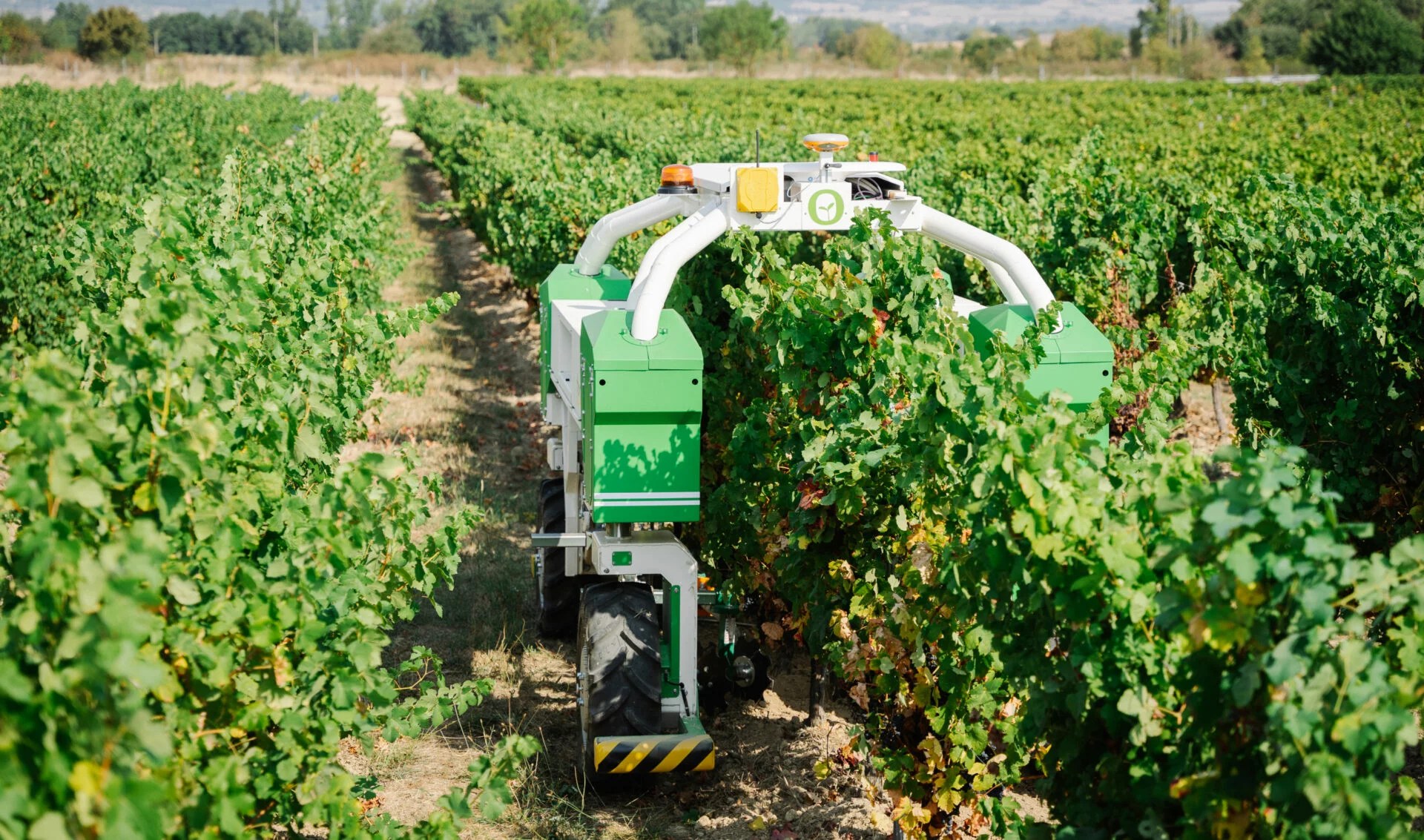‘Autonomous machine operating here,’ says the sign. ‘Stay away.’ And instead of the chatter of the vendangeuses, there’s the hum of a robot. Welcome to southern France, 2024, just down the lane from my house, where, walking the dogs among the vines, I stumble upon Ted, a compact, green and white, battery-powered cultivator, guided by GPS satellites. Ted is not dissimilar in principle to a robot lawnmower or vacuum, but is the size of a family car.
The French ban on chemicals has created a vast amount of work for growers
He is toiling away, straddling the vines and chopping up the mauvaise herbes. He is neither cute nor friendly or even that smart, though he will stop dead in his tracks if he encounters a human obstacle. He cost €200,000 but doesn’t stop for lunch and at the end of the day he’s plugged in for a battery recharge by Fabien, his human supervisor.
Weeding under vines, instead of dowsing them with chemicals, is a tedious and demanding job. Precision is essential, to cut the weeds and not damage the vines. For the organic growers, and the many more engaged in agriculture raisonnable, the most effective herbicides are generally forbidden, although there are a few rogues who continue to soak their vines in potions illegally imported from Spain.
The French ban on chemicals has created a vast amount of work for growers, involving cultivation using diesel-powered tractors or even manual labour using hoes. Some have used sheep for early season weeding but once the grapes start growing, they eat the harvest. Enter rechargeable, zero-emissions Ted, powered by nuclear electricity from the Rhone Valley, equipped with blades for cultivating the earth and flexible ‘fingers’ for attacking the weeds, pulling them up so that they might be returned to the soil.
Among the various duties of a grape grower, weeding is not the most récherché. It needs to be done repeatedly. But Ted does not resent this work, indeed it is his sole reason for existence. Ted was made by Naïo technologies, a French start-up based near Toulouse. The vignerons laughed at the first prototypes of Ted but there are now 450 Naïo robots of various shapes and sizes working on farms in France and beyond. ‘This is a transformation that could happen quickly,’ a local grower, Philippe, told me. ‘Even faster if they let us put up solar panels and then we won’t even have to buy diesel.’ That’s controversial. The farmers obviously want energy autonomy but the environmentalists fear the countryside will be ruined.
Ted will hum away for six hours before his lithium battery runs down. He makes up in endurance what he lacks in speed. The field, the bigger the better, is mapped in advance with a positioning receiver, the map is uploaded to Ted’s memory and after that the robot is on his own. He is admirably discreet. Were it not for the compulsory health and safety warning signs at the edge of the parcels on which he is employed, passersby might not even know he was there. Ted has a lower profile than a tractor, is practically silent and trails no stinky diesel fumes.
What’s not to like about Ted? It’s a question with a nuanced answer. Farmers are always complaining, about everything from the weather to prices. They consume billions in subsidies and constantly demand protection from competition. They claim with reason that their work is backbreaking and dangerous. They engage in mindless tasks like driving air conditioned diesel tractors up and down fields all day. Is it cynical to ask if robotics may be a chance to substitute artificial intelligence for whining farmers? Or is more at stake?
Consider the chewy red wine made by Pierre around the corner, the grapes picked by hand. He’s not stomping on grapes in his bare feet. He has an expensive Italian juicer. But he’s playing jazz saxophone to his fermenting juice, resting in its stainless steel tanks. That magic in the bottle surely counts for something.
Ted is the first agricultural robot to have made it to our sleepy commune which is evidence enough that this is not some distant revolution but is on the doorstep. The age of the human-driven machine is ending, the massive grape harvesters are becoming mastodons. Robots will soon be harvesting grapes and soon, everything else. It remains only to produce a machine for pruning and training the vines. This will arrive as advanced AI and vision sensors are integrated into the robots, although it conjures the disturbing image of a scissor-handed robot that nobody will want to run amok.

Naïo has expanded operations to California and its machines have reached Canada. Established agricultural machinery companies like John Deere and Kubota and AI start-ups in the United States, Italy and France are also pushing into the market. Robots are already picking strawberries in Spain. YouTube has an almost balletic video of an Israeli robot picking peaches.
Wine has been the principal activity in my village for 1,000 years, starting with human labour, then horses then tractors and now Ted. The Romans made wine here, a syrupy goo not much as we would recognise it, using slaves. There were 300 horses in our village by the time the railway arrived in the 18th century, and the villagers grew rich on exports of vin ordinaire that would have been pretty mediocre but safer to drink than water, mostly. That prosperity came to a halt with phylloxera killing the vines and then the Great War, depression and war again.
The pieds noir expelled from Algeria arrived in the 1960s, buying land and tractors. More recently, ambitious garagistes have come, buying vines, converting them to organic, making innovative and refined wines. Occitanie is no longer isolated. We now have a TGV, autoroutes and airports. We’re suddenly the Florida of Europe, with grapes.
So now what? Are these the end days of traditional viticulture and agriculture, the start of a new era eliminating farmers and replacing them with systems engineers, tasked with keeping the robots going? Resistance, I suspect, will be futile. The biggest and richest producers will take the plunge first, and the smaller boutique producers will resist the longest, harvesting their grapes by hand until they are finally national curiosities.
The Salon d’Agriculture in Paris, the spectacular annual showcase of French farming, starts this week. Aside from the likely renewed demonstrations of farmers demanding more protection, this year the salon will attract plenty of talk about zero-emissions ‘autonomous agriculture’. Farming would be great if it wasn’t for farmers, some might say, observing the recent chaos created by angry French farmers. Let’s be careful what we wish for. À table we may not know what we’ve lost until it’s gone. The robots may decide to feed us crickets.







Comments